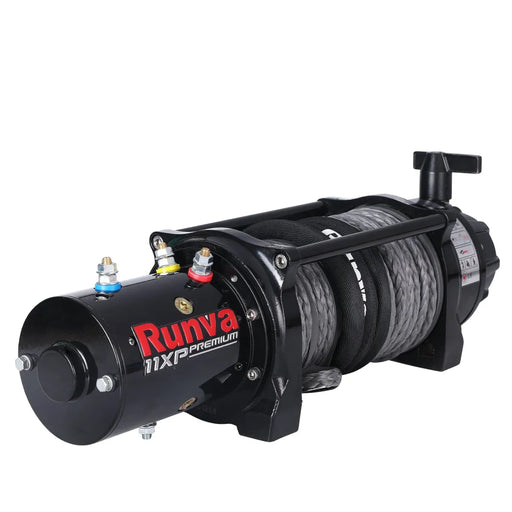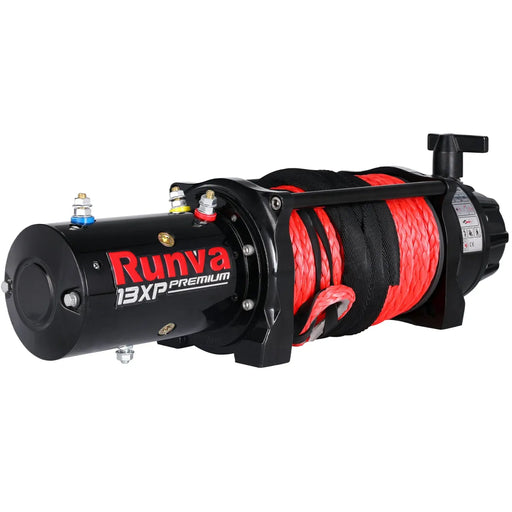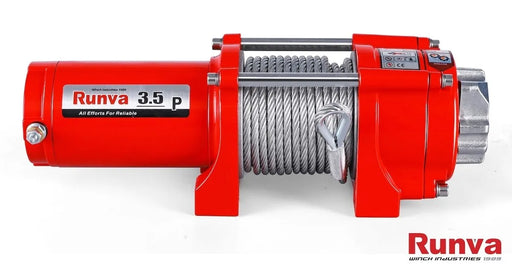Choosing the Best 4x4 Winch for your Vehicle

We get calls from customers daily asking for our help with what winch is the right winch for their vehicle (or situation or circumstance if it’s for a boat or otherwise). The selection of electric winches in the market is substantial and knowing which one will suit you (and your wallet) is no easy task.
There’s plenty of “choosing the right winch” guides out there but most are fairly basic. We’ve decided to do a bit of a deeper dive with ours. In the end the best decision is a fully informed decision and so with that said, we’re going to try and provide you with the tools to make the best decision possible.
So who's this guide for? This guide is aimed at the casual explorer and off-road touring enthusiast, not the hardcore sport-winching guy or gal. While we have sport winches available, this guide is written more for the consumer looking for a straight up recovery device to help them when trouble strikes.
We also plan on keeping this guide as up to date as possible, as vehicles and technology change, brands come and go, and the market shifts and adjusts, we will keep tweaking, adding, removing and adjusting where necessary. Make sure you subscribe to our newsletter below to stay informed when updates occur.
TABLE OF CONTENTS
- Winches - They’re a bit like Insurance
- What Makes up a Winch
- Do You Really Need a Winch?
- Considerations
- Winch Price and How Much You Should Spend
- Winch Pulling Capacity
- Steel Winch Cable or Synthetic Rope?
- Winch Cable Length
- Weight - Your Vehicle and Bar Winch and Weight Requirements
- Winch Mounting Methods
- A Good Warranty Is Everything
- Recommendations
- Do your Homework
Winches - They’re a bit like Insurance
If you plan on taking your trusty steed off-road, you will eventually get stuck. It is not a matter of if, but when, and it doesn’t matter if your terrain of choice is rocks, mud, snow, or sand.
A winch is one upgrade that new 4WD owners often overlook. While a winch will not give your 4x4 the same performance boost that you will get from a suspension or tyre upgrade, the peace of mind you’ll have knowing it’s there should you need it will make your next off-road adventure a lot more enjoyable.
New 4x4 vehicle owners usually go out to test their new ride in rough terrain without considering the possibility that they could end up getting stuck. It’s this kind if scenario that a winch becomes an indispensable tool that will greatly help you with your vehicle recovery.
Winches have been around for thousands of years, helping people move heavy objects that would otherwise be impossible to budge. And since the advent of electric 4x4 winches, they’ve become an indispensable accessory for any off-road vehicle owner.

The old adage “rather have it and not need it than need it and not have it” comes to mind. You might not use your winch very often, but when you need it, boy is it a lifesaver! And it will certainly make you appreciate this simple but very helpful vehicle recovery tool.
Selecting the correct winch for your vehicle and your specific requirements can be a confusing and daunting (not to mention expensive) exercise. Thankfully we’re here to help!
What Makes Up a Winch?
Winch Definition:
“a hauling or lifting device consisting of a rope or chain winding round a horizontal rotating drum, turned typically by a crank or by motor.”
For the uninitiated, an electric winch is a tool commonly used in vehicle recovery. It’s typically bolted to the front of a vehicle (usually a 4WD or truck) and is used when the vehicle gets stranded and needs help getting pulled out from wherever it’s ended up stuck.
A winch is made up of various components and these include:
Steel Cable/Synthetic Rope
A winch’s cable is commonly made of either steel cable or synthetic rope. Some prefer one material over the other depending on their preference and needs. Each has it's pros and cons which we go through further down.
Winch Drum
The drum on a winch allows the wire to be neatly wrapped when not in use. The winch spool will rotate the drum which then winds the cable.
Gear Train
The gear train is the part of the winch that gears down the motor and turns the winch. The lower the gear ratio, the faster winch.
Winch Motor
The winch motor powers the drum so it can pull and wrap the wire around itself. Winches are typically available in 12 volt or 24 volt models.
Winch Control Box
This is the brain of the winch, and usually consists of wires and a small electrical board that operates the motor. This box, depending on the winch, can usually be mounted on the winch, or within the engine bay with cables running to the winch motor and vehicle battery.

A 12,000lb Winch Motor on a Carbon 12k 4x4 Winch
Do I Really Need a Winch?
There are really just two questions that when answered will help you determine whether you need a winch:
- Do you plan on going off-road on potentially challenging routes with your vehicle?
- Will you ever be travelling solo? Solo meaning there won’t be another four wheel drive vehicle with you.
If you answered no to question 1, and your 4WD is used primarily on standard roads then the likelihood of you requiring a 4x4 winch is almost none.
However, if you answered yes to both questions, then you absolutely should purchase and install a winch on your vehicle. As mentioned above, if you’re going to be travelling off-road it’s not a matter of if you’ll get stuck, it’s when. Don’t risk it.
A winch is an assurance that you will be able to get out of almost any sticky situation on your own. Self-recovery will become much easier, especially in remote locations as you won’t have to wait for help to recover your 4WD.
If question 1 is YES, but question 2 is NO then you need to ensure that who you’re travelling with does have a winch, and that you have at the very least, a decent recovery kit with a good quality snatch strap. That way if either of you get stuck, you can help each other out using the available vehicle, recovery kit and winch.
Keep in mind that your mate with the winch will undoubtedly rub it in your face that he saved your ass. You’ve been warned! ;)
Things to Consider When Buying a Winch
There are a number of factors that should be considered when choosing the correct 12 volt winch for your vehicle, and your overall off-roading needs.
It’s easy to just go with the flow and pick the first winch your mate recommends, or that guy on the Australia 4wd forum with the handle 4wdmaster. He really seems to know it all right? Wrong. Do your research, tick the boxes below and find the right winch for your needs.
Here are some of the things that you need to consider when you are shopping for this important vehicle recovery tool.
Winch Price and How Much You Should Spend
Cost is an obvious factor in any buying decision. But when you begin digging into what attributes of a winch you really want and need, the results usually impact the cost. This can then become something you have little control over.
That’s not to say you have to spend your retirement on a new winch that ticks all the boxes, but going for the cheapest option will often hurt more down the line.
There are a heap of winch options out there, ranging in price from the dirt cheap $300 options right into the thousands of dollars gold standard types. And for the most part they all claim to be the best in the business. And with exciting and catchy names that elicit visions of rugged unstoppable power, what’s not to believe right?
Well, we’re not going to rag on the cheapos but just beware the old saying you get what you pay for. There’s nothing quite like that feeling you get when you’re a thousand miles from nowhere and your $299 winch burns out on you. You’ve been warned.
Runva Performance Winches are easily one of the best priced winching and recovery brands available. Their products aren’t cheap, but they’re also not eye-watering expensive. Runva make a mid-priced high quality winch that has a great reputation in the market.
Warn Winches certainly have a reputation for being a top-of-the-range recovery brand. Developed in the United States and sold in more than 65 countries around the world, it’s a solid brand. Warn is a great premium product but it comes at a price.
Capacity Rating
Considering that the primary purpose of a 4x4 winch is to pull you out of whatever situation you find yourself in, it’s important to know the winch in question will be strong enough to do the job.
Winches are rated by the weight that they can pull, known as the winch line capacity rating. This is usually shown in pounds (lb), which can be translated to kilograms (kg) with a simple calculation:
divide the pounds of the winch by about 2.205. Or multiply the kilos of your vehicle by 2.205 to get the minimum pounds your winch should be rated to.
The capacity rating of the winch that you choose should always be more than the gross weight of your vehicle.
When checking the gross weight of your 4x4, it’s important to include all your gear and accessories that you will tow in addition to the actual weight of your vehicle. Be sure to include items such as roof top tents, water tanks, and any other heavy items.
It’s best to choose a 4wd winch that can pull up to 2 times the gross mass of your vehicle.
QUICK TIP
It can be easy to get bogged down in the line pull capacity of your winch vs your vehicle's weight. Don’t forget that a winch’s pulling capacity can almost be doubled through the use of a pulley block and doubling the rope/cable - a.k.a. 'a double line pull'.
This does slow the process down, but it has many benefits that can be a real lifesaver.
Check out the following video of a double line pull out in the bush:
Winch Cable or Rope?
For a detailed breakdown on the differences between the two check out our Choosing the Right Winch Cable article. In summary, steel winch cables are often chosen because of their durability. They don’t easily wear out when used in mud or dragged over the ground or sharp rocks. However, while steel cable is usually cheaper than synthetic, it is heavier and can be prone to rust.
On the other hand, synthetic rope is much lighter than steel cable and can fit more length on the winch spool. While it is more expensive than steel cable, synthetic rope has its benefits. It can be tied and fixed again if it snaps, it floats in water, and it’s lightweight, to name a few.
The only significant downside of synthetic rope is that it is more susceptible to wear, especially when it is dragged over the ground. It also requires a bit more maintenance to ensure it lasts.

Length of the Cable
These days almost all winches come with the winch cable or synthetic rope. It’s usually between 25 - 30m in length which is a good start.
It’s recommended that you include a decent 20m winch extension in your recovery kit as you never know when you might need that additional length. You’d be surprised how quickly 30m of cable is used up, especially if you need a double line.
Weight - Your Vehicle and Bull Bar’s Winch and Weight Requirements
Aside from the gross weight of your vehicle, you should also pay attention to the weight that you’re loading up front. Once you add a bull bar and then the winch it can easily tip the scales and push your suspension to it’s limits. Generally speaking a decent bullbar will sit around 60kgs, and a winch at 30kgs and you’re already pushing certain vehicle limits.
If you overload your vehicle it will affect it’s structural integrity, not to mention make the driving experience crappy and even jeopardise your insurance (it’s technically illegal to overload your vehicle). Consider upgrading your suspension if you’re going to be pushing the weight limits.
Winch Mounting Methods
There are various ways of mounting a winch (bumper, multi-mount, hidden etc). Most winches allow for whatever method of mounting you want, with the various brackets included.
When making your decision on a winch consider which method you will be going with and check that the winch includes everything required for the installation. Most winches are ready for a standard mounting on a winch compatible bullbar with all the necessary brackets and bolts.
If you’re unsure about whether the winch will fit your bull bar be sure to check the various specifications of the winch against the bar. Primarily you’ll want to check the mounting bolt pattern of the winch (where the bolt holes are placed that will hold your winch in place) and the overall dimensions of the winch to confirm that your bar provides sufficient space.
A Good Warranty is Everything
Any self respecting winch brand should have a minimum 3 year warranty across their electrical components, that includes water ingress.
Always ensure the warranty of the 4x4 winch you’re considering includes protection against water ingress damage. Often this is assumed but on deeper inspection (i.e. buried in the fine print) they exclude it.
You also ideally want a brand that has a decent local presence with easy to reach support. You’re going to want to be able to pick up the phone and speak with a real knowledgeable person about any trouble you might be having and not have to rely on back and forth emails, some wide eyed sales kid, or some foreign call center.
RECOMMENDATIONS
We have our go to winches that we suggest to most of our customers. Of course it all depends on their circumstances, but if you're after a solid, dependable and reliable 4x4 12v winch then we like to suggest one of the following:
Runva 11XP Premium Red Edition 12v Winch
Carbon Offroad 12K 12v Winch
Warn VR Evo 12-S Winch
These three models fall into the perfect pricing bracket, come loaded with extra value and have excellent reputations in the community. They also have great warranties and manufacturer support should you ever need it.
And if you're interested in one of the above Runva winches, checkout the below article:

Do your Homework
Once you’ve narrowed down your options do some basic Google research with the brand, model of the winch and add ‘reviews’ at the end. For example if you’re considering a Runva 11XP Premium Winch, go to google.com.au and type “Runva 11XP Premium Winch reviews” and do some reading. Go to Youtube.com and type the same thing. A lot of enthusiasts out there have put up videos of their installations, along with reviews and experience.
We’ve got a great 4WD community in Oz, use it. Feel free to reach out to us, we’d be happy to talk through the process, provide some guidance and help you make the right decision. You can call us on
Forums such as https://4x4earth.com and the https://australia4wd.com/ forum are full of great people too, who are willing to share their heaps of knowledge and information. Don’t be afraid to reach out and ask for some guidance.
Be sure to check out our selection of the best 4x4 winches available. All our winches come fully supported in Australia with nationwide service support, with 3 year, 5 year and lifetime warranties.


























